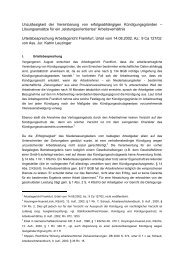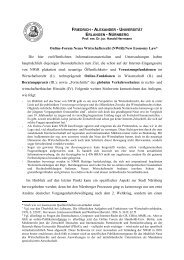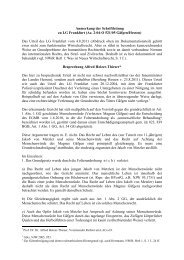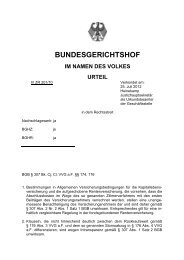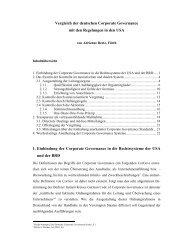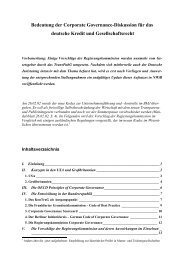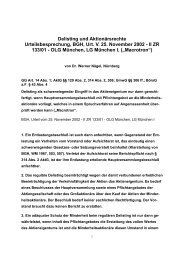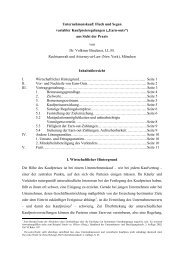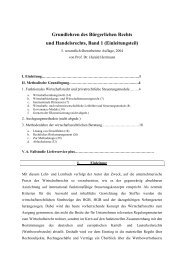Chapter 1: General Contract Law and Law of Sales Harald ... - Nwir.de
Chapter 1: General Contract Law and Law of Sales Harald ... - Nwir.de
Chapter 1: General Contract Law and Law of Sales Harald ... - Nwir.de
Create successful ePaper yourself
Turn your PDF publications into a flip-book with our unique Google optimized e-Paper software.
Other European law systems do not explicitly rely on the consi<strong>de</strong>ration theory. However,<br />
promises <strong>of</strong> donations need to be contracted in written form un<strong>de</strong>r German law also. Loan<br />
guaranties without commercial value to the guarantor are not valid if they are not in written<br />
form. That is why some German scolars think that the consi<strong>de</strong>ration doctrine is – in a way –<br />
Europeanised. 1 To some extent, this is correct. However, in the mentioned insurance case both<br />
law systems differ essentially. The Europeanisation, therefore, is incomplete.<br />
III. Offer <strong>and</strong> Acceptance<br />
1. The Concept <strong>and</strong> its Limits<br />
The basic theory <strong>of</strong> contract conclusion is called <strong>of</strong>fer <strong>and</strong> accepance-theory, because two<br />
relatively similar <strong>de</strong>cisions <strong>and</strong> <strong>de</strong>clarations have to be ma<strong>de</strong> before a contract becomes<br />
binding. The origins <strong>of</strong> this theory are – again – to be seen in the Roman law. Nearly all civil<br />
laws <strong>of</strong> the EU-member states have adopted this concept. In German law, however, it has<br />
been integrated most consequently as follows:<br />
Sphere <strong>of</strong> Offerer<br />
<strong>Contract</strong> Partner<br />
Decision Making (DM)<br />
/Communication (C) Sending Arrival Reading<br />
(Mail Box) § 130 BGB<br />
§ 130<br />
Reading Arrival Sending DM/C<br />
<strong>Contract</strong> (+)<br />
Anglo-American law (Mail Box)<br />
UK-law has <strong>de</strong>veloped the so-called mail box-rule (also postal rule) which means that the<br />
acceptance becomes legally binding before the time <strong>of</strong> arrival: already when the other party<br />
puts the acceptance letter into the mail box. UK courts argue that the <strong>of</strong>ferer, by sending his<br />
<strong>of</strong>fer by mail, has agreed to use this way <strong>of</strong> communication. Therefore he must bear the risk<br />
<strong>of</strong> a false or <strong>de</strong>layed transfer <strong>of</strong> the acceptance letter by the postal service, also.<br />
Example: After having sent away his letter <strong>of</strong> acceptance for a long term credit contract with<br />
fix 7.5% nominal interest rate, the sen<strong>de</strong>r (S) gets an <strong>of</strong>fer on 6.5% <strong>of</strong> a competitor (B) <strong>of</strong> the<br />
<strong>of</strong>ferer (A). He sends a fax or an e-mail to withdraw his acceptance <strong>and</strong> accepts the <strong>of</strong>fer <strong>of</strong> B.<br />
A claims for an expected interest income <strong>of</strong> the stipulated term <strong>of</strong> the credit.<br />
1 Kötz, Eurp.PrivR.<br />
4



